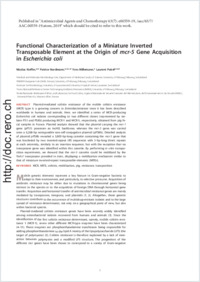Functional characterization of a miniature inverted transposable element at the origin of mcr-5 gene acquisition in Escherichia coli
- Kieffer, Nicolas Medical and Molecular Microbiology Unit, Department of Medicine, Faculty of Science, University of Fribourg, Switzerland - INSERM European Unit (IAME, France), University of Fribourg, Switzerland
- Nordmann, Patrice Medical and Molecular Microbiology Unit, Department of Medicine, Faculty of Science, University of Fribourg, Switzerland - INSERM European Unit (IAME, France), University of Fribourg, Switzerland - Institute for Microbiology, University of Lausanne and University Hospital Centre, Lausanne, Switzerland - Swiss National Reference Center for Emerging Antibiotic Resistance (NARA), University of Fribourg, Switzerland
- Millemann, Yves Ecole Nationale Vétérinaire d’Alfort, and Laboratory for Food Safety, Agence Nationale de Sécurité Sanitaire de l’Alimentation, de l’Environnement et du Travail (ANSES), Université Paris-Est, Maisons-Alfort, France
- Poirel, Laurent Medical and Molecular Microbiology Unit, Department of Medicine, Faculty of Science, University of Fribourg, Switzerland - INSERM European Unit (IAME, France), University of Fribourg, Switzerland - Swiss National Reference Center for Emerging Antibiotic Resistance (NARA), University of Fribourg, Switzerland
-
13.05.2019
Published in:
- Antimicrobial Agents and Chemotherapy. - 2019, vol. 63, no. 7, p. e00559-19,
English
Plasmid-mediated colistin resistance of the mobile colistin resistance (MCR) type is a growing concern in Enterobacteriaceae since it has been described worldwide in humans and animals. Here, we identified a series of MCR-producing Escherichia coli isolates corresponding to two different clones (represented by isolates PS1 and PS8b) producing MCR-1 and MCR-5, respectively, obtained from pig fecal samples in France. Plasmid analysis showed that the plasmid carrying the mcr-1 gene (pPS1) possesses an IncHI2 backbone, whereas the mcr-5 gene was carried onto a 6,268-bp nontypeable non-self-conjugative plasmid (pPS8b). Detailed analysis of plasmid pPS8b revealed a 3,803-bp-long cassette containing the mcr-5 gene that was bracketed by two inverted-repeat (IR) sequences with 5-bp-long direct repeats at each extremity, similarly to an insertion sequence, but with the exception that no transposase gene was identified within this cassette. By performing in vitro transposition experiments, we showed that the mcr-5 cassette could be mobilized by the TnAs1 transposase provided in trans, displaying a mobilization mechanism similar to that of miniature inverted-repeat transposable elements (MITEs).
- Faculty
- Faculté des sciences et de médecine
- Department
- Médecine 3ème année
- Language
-
- English
- Classification
- Biological sciences
- License
- License undefined
- Identifiers
-
- RERO DOC 326994
- DOI 10.1128/AAC.00559-19
- Persistent URL
- https://folia.unifr.ch/unifr/documents/307970
Statistics
Document views: 78
File downloads:
- poi_fcm.pdf: 160
